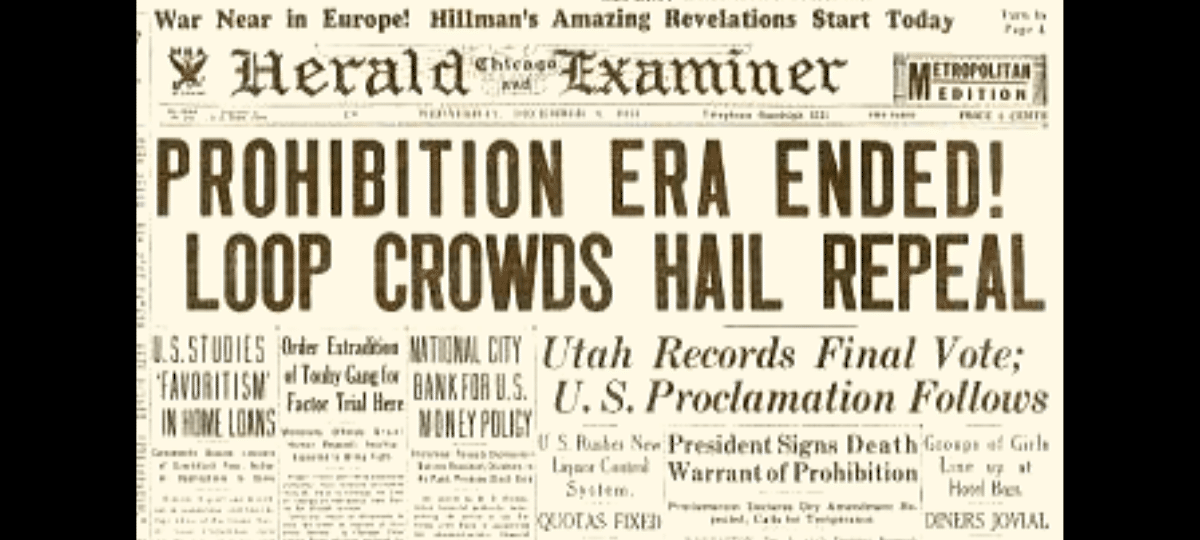History was made on this day in 1933 when the 18th amendment was repealed, effectively ending America’s national prohibition of alcohol, erasing what could arguably be considered the most blatant attacks on personal liberty to come out of Progressive Era.
The prohibition of alcohol may be one of the greatest examples in the 20th century of the government trying to overstep its bounds by attempting to become the moral arbitrator of right and wrong within civilized society. Instead of transforming men into angels through social engineering, the movement intended millions of Americans suddenly became criminals by trying to consume or sell an alcoholic beverage.
A study conducted by Mark Thorton of the Cato Insitute notes America had seen a steady decline in crime over the 19th and 20th centuries. However, due to the Prohibition of alcohol, the homicide rate in large cities had a 78% increase over the pre-prohibition period due to restrictions placed on alcohol.
The birth of organized crime was another disastrous consequence of the government’s war on booze. This era saw the rise of infamous mob bosses like Al Capone, who greatly profited from the sale of illegal hooch. Dave Roos of History.com makes mention of the fact that it was Prohibition that was the launching pad for organized crime in America in his interview with Howard Abadinsky, author of Organized Crime. “Suddenly gang leaders are making deals with each other,” says Abadinsky, forging mutual protection pacts across state and international borders, and across ethnic lines, to ensure that shipments of illegal alcohol poured freely into the big cities.
“These are very violent people who are used to solving problems by killing them, but eventually they sit down and say, ‘We’ll guarantee peace in your area if you guarantee peace in our area.’ That’s called syndicated crime, this cooperation between criminal groups,” says Abadinsky. “In the absence of Prohibition, we wouldn’t have had the kind of syndicated criminality that occurred. Prohibition was the catalyst.”, says Roos, according to History.com.
As if a sharp rise in the homicide rate and the birth of organized crime in the states was not enough, you can also blame the Prohibition Movement and Progressives of the Temperance societies and their pollical allies for the deaths of around 13,000 people. In 1927, Time Magazine reported that the government introduced a new system for “denaturing” alcohol. Denaturing was the adding of unappetizing or toxic chemicals into industrialized liquor in an effort to keep people from drinking industrial-grade alcohol to avoid paying a tax on alcoholic drinks. The process introduced by anti-alcohol advocates in government made spirits toxic to consume. “The new formula included “4 parts methanol (wood alcohol), 2.25 parts pyridine bases, 0.5 parts benzene to 100 parts ethyl alcohol”, Time Magazine reported. Time also reported that this formula was known to cause blindness.
No matter what an individual may think about the consumption of alcohol or drugs on a personal level, if we learn one thing from Prohibition, it’s that banning things never works. More often than not, it makes the problem much worse. The suffering created by the assault on the liberty of Americans that was created by the 18th amendment was worsened by the $300 million dollars needed to enforce the tyrannical law.
And so we remember the passing of the 21st amendment, which officially marked the end of the era of Prohibition on December 5th, 1933. May I propose a toast to all my compatriots – I say, have a drink and remember, Prohibition stinks!





2 comments
… [Trackback]
[…] Here you will find 39745 additional Info to that Topic: thelibertarianrepublic.com/remembering-the-tyranny-of-prohibition/ […]
… [Trackback]
[…] There you can find 64409 more Info on that Topic: thelibertarianrepublic.com/remembering-the-tyranny-of-prohibition/ […]